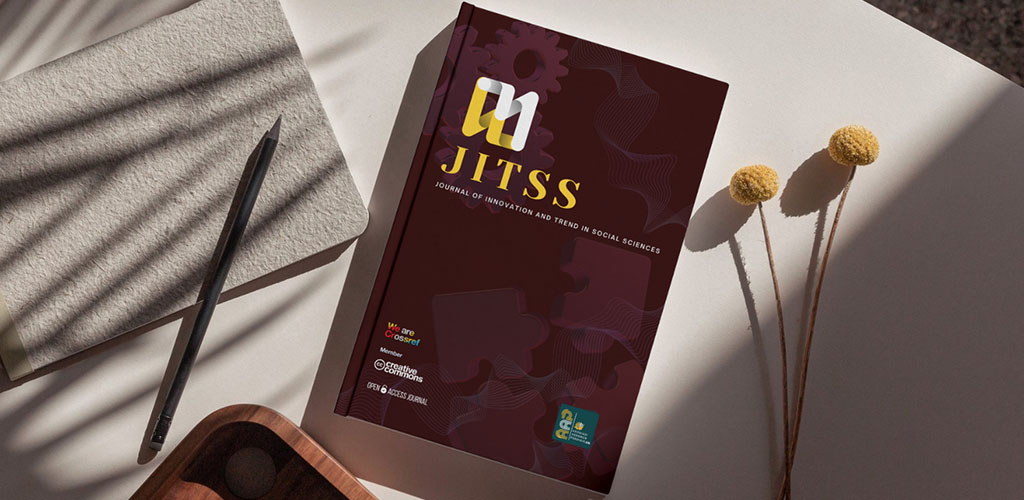


JITSS (Journal of Innovation and Trend in Social Sciences) is a peer-reviewed journal published by Asosiasi Asesmen Pendidikan (AAP). Established in 2024, JITSS is committed to publishing articles that cover a wide array of topics within the social sciences. In collaboration with the Information Technology Education Study Program, Universitas Bina Bangsa and Asosiasi Asesmen Pendidikan (AAP) publishes the journal thrice yearly with Online ISSN 3064-1977. It aims to highlight the latest and most significant developments in fields such as Anthropology, Economics, Education, Geography, History, Law, Linguistics, Political Science, Criminology, Cultural Studies, Psychology, Social Policy, Social Work, and Sociology. The journal serves as a platform for sharing and disseminating high-quality academic research, offering insights and advancements across various social science disciplines.
JITSS encourages the dissemination of innovative ideas and theoretical advancements by promoting rigorous scholarship, thereby fostering intellectual development and stimulating academic discourse. The peer-review process of the journal is intended to maintain the highest standards of scholarly integrity, guaranteeing that each article published satisfies stringent quality and originality standards.
JITSS is committed to establishing a connection between theory and practice, in addition to serving as a repository for scholarly work. The journal endeavors to inform policy-making and practical applications in a variety of social science disciplines by showcasing research that addresses real-world issues and challenges. This practical relevance renders it a valuable resource for academics, practitioners, policymakers, and anyone interested in the dynamic and evolving landscape of social sciences.
JITSS published three a year (April, August and December). Jurnal JITSS has been indexed in Crossref, Google Scholar, Garuda, Dimensions
ONLINE SUBMISSION
Already have a Username/Password for JITSS Please click he for LOGIN, Need a Username / Password? please clik here for REGISTRATION.
OUR TIMELINE AND JOURNAL PUBLICATION
Do you want to look our latest publication >> CURRENT
or See all our publication >> ARCHIVES
If you have some problem or questions, don't hesistant >> CONTACT US
For quick response please send e-mail to jurnal@aapbk.org . Please mention your subject: Your Name and what kind of your problem with our Online Submission system. Our team will reply to all your questions or problems related to our Journals as soon as possible or at least 24 hours after you send the message. Thank you for your patience.
Authors who intend to submit a manuscript for publication in JITSS (Journal of Innovation and Trend in Social Sciences) is obliged to understand correctly the instructions and the ins and outs of the provisions on this journal. For authors who have never published the article in this journal, we recommend reading all of the terms and conditions are listed in the journal. Authors are requested to prepare a manuscript in accordance with the Instructions for the preparation of the manuscript and then to follow the Author Guidelines for submission. Before the manuscript is submitted to the editorial team, please make sure that your paper is prepared using the journal paper template. The authors must refer to JITSS (Journal of Innovation and Trend in Social Sciences) for writing format and style (Please download and use as a template for the initial manuscript submission). This will ensure fast processing and publication. Any papers not fulfilling the requirements based on the guidelines to authors or focus and scope, with great regret, will not be processed and automatically rejected.
Vol. 2 No. 2 (2025): JITSS (Journal of Innovation and Trend in Social Sciences)
All articles in this issue were authored/co-authored from 2 countries (Indonesia and Poland)


Table of Contents
Articles
- Vania Zulfa, Universitas Negeri Jakarta, Indonesia
- Mulyati Mulyati, Universitas Negeri Jakarta, Indonesia
- Nurhasana Ana, Universitas Negeri Jakarta, Indonesia
Abstract
The Effect of Adolescent Boys' Attachment to Fathers on Social and Emotional Development
Vania Zulfa, Mulyati Mulyati, Nurhasana Ana
Father involvement during adolescence remains relatively low and may negatively impact boys' social skills and emotional regulation. This research aims to provide deeper insight into how adolescent boys’ attachment to their fathers contributes to their social-emotional development. This study employed an associative quantitative method involving 71 respondents selected through purposive sampling, based on the criteria of male students aged 15–18 years who lived with their fathers. Data were collected using adapted research instruments, namely the Inventory of Parent and Peer Attachment (IPPA) and the Social-Emotional and Character Development Scale (SECDS). Simple linear regression analysis was used to test the hypothesis. The results show a significant influence of father–son attachment on social-emotional development (Fcount = 15.817 > Ftable = 3.98; p < 0.05). The determination coefficient (R Square) of 0.186 indicates that 18.6% of the variation in social-emotional development is explained by attachment to fathers, while the remaining 81.4% is influenced by other unexamined factors. The findings highlight the importance of fathers' involvement in fostering adolescents' social-emotional development. Therefore, schools are encouraged to optimize guidance and counseling services by providing family engagement programs, including parenting workshops and father–child counseling, to strengthen paternal support.
- Ahiruddin Ahiruddin, Universitas Indraprasta PGRI, Indonesia
- Ega Rachel Emmanuel, Universitas Indraprasta PGRI, Indonesia
- Rosada Rosada, Universitas Indraprasta PGRI, Indonesia
Abstract
The Influence of Self-Control on Phubbing Behavior among Vocational High School Students in West Jakarta
Ahiruddin Ahiruddin, Ega Rachel Emmanuel, Rosada Rosada
Technological developments and the increasing use of smartphones have influenced adolescents' social interaction patterns, including the emergence of phubbing behavior, which is the tendency to ignore others because of focusing on mobile phones. Low self-control is suspected to be a contributing factor to this behavior. This study aims to determine the relationship between self-control and phubbing behavior among students of SMK Tri Arga 2 West Jakarta. The study used a quantitative approach with a simple random sampling technique and involved 200 students as a sample. The instruments used were the Self-Control Scale and the Phubbing Behavior Scale with a 4-point Likert model. All items were declared valid and reliable through validity tests and Cronbach's Alpha > 0.70. Data analysis used the Pearson Correlation test via SPSS version 26. The results showed a significance value of 0.000 (<0.05) and a correlation value of -0.570, indicating a significant and negative relationship between self-control and phubbing behavior. The higher the student's self-control, the lower the phubbing behavior they exhibit. The results of this study are expected to contribute to the development of guidance and counseling services, particularly in strengthening self-control as a preventive effort to reduce phubbing behavior in the school environment.
- Reza Fatmawati, Universitas Indraprasta PGRI, Indonesia
- Dewi Justitia, Universitas Negeri Jakarta, Indonesia
Abstract
Self-Esteem and Relational Aggression in Students' Social Life
Reza Fatmawati, Dewi Justitia
The phenomenon of relational aggression among students is increasingly evident in peer interactions. This condition is often associated with students’ levels of self-esteem, as individuals with lower self-esteem tend to be more vulnerable to displaying relationally aggressive behaviors. This research aims to examine the relationship between relational aggression and self-esteem among students at SMP Negeri 95 Jakarta Utara, as well as to describe the overall patterns of both variables. This research employed a descriptive quantitative approach, involving a sample of 180 students from SMP Negeri 95 Jakarta Utara. The measurement tools consisted of two questionnaires developed by the researcher. Validity testing indicated that all items in both instruments were valid, and the reliability test using Cronbach’s alpha yielded coefficients of 0.87 for the self-esteem questionnaire and 0.88 for the relational aggression questionnaire, indicating strong reliability. Data were analyzed using SPSS version 27 with a correlational technique. The findings revealed a significant relationship between self-esteem (X) and relational aggression (Y). The correlation between the two variables was categorized as weak, with a negative coefficient of –0.255, indicating that higher self-esteem is associated with lower levels of relational aggression among students.
- Wiktor Daniszewski, Pomeranian Medical University in Szczecin, Rybacka 1, 70-204, Szczecin, Poland
- Wiktoria Knobelsdorf, Pomeranian Medical University in Szczecin, Rybacka 1, 70-204, Szczecin, Poland
- Gabriela Furtak, University Clinical Hospital No.2 of Pomeranian University in Szczecin, Szczecin, Poland
- Maria Łagódka, Hospital in Puszczykowo, Puszczykowo, Poland
- Michał Pogoda, Pomeranian Medical University in Szczecin, Rybacka 1, 70-204, Szczecin, Poland
- Katarzyna Zając, Pomeranian Medical University in Szczecin, Rybacka 1, 70-204, Szczecin, Poland
- Dominika Pietrzyk, Pomeranian Medical University in Szczecin, Rybacka 1, 70-204, Szczecin, Poland
- Bartosz Oder, Pomeranian Medical University in Szczecin, Rybacka 1, 70-204, Szczecin, Poland
- Maciej Ćmil, Independent Public Voivodeship Integrated Hospital in Szczecin, ul. Arkońska 4, Szczecin, Poland
- Wojciech Karchut, Pomeranian Medical University in Szczecin, Rybacka 1, 70-204, Szczecin, Poland
Abstract
Systemic Effects of Phosphodiesterase Type 5 Inhibitors Beyond Erectile Dysfunction: A Narrative Review
Wiktor Daniszewski, Wiktoria Knobelsdorf, Gabriela Furtak, Maria Łagódka, Michał Pogoda,...
Phosphodiesterase type 5 inhibitors (PDE5Is) are widely prescribed for erectile dysfunction; however, growing evidence indicates that their pharmacological effects extend beyond urological indications and involve multiple organ systems. This narrative review aims to synthesize and critically evaluate current evidence on the systemic effects of PDE5 inhibitors across cardiovascular, renal, neurological, and urological domains, as well as emerging therapeutic indications. A comprehensive literature search was conducted using PubMed, Scopus, and Web of Science for studies published up to May 2024, including preclinical studies, clinical trials, observational studies, systematic reviews, and meta-analyses. The reviewed evidence demonstrates that PDE5 inhibitors are associated with reduced cardiovascular morbidity and mortality, improvements in cardiac and pulmonary hemodynamics, preservation of renal function in diabetic populations, potential neuroprotective effects against cognitive decline and ischemic stroke, and symptomatic improvement in benign prostatic hyperplasia and lower urinary tract symptoms. Additional benefits have been reported in conditions characterized by vascular dysfunction, such as angina pectoris and Raynaud’s phenomenon. Overall, PDE5 inhibitors represent a pharmacologically versatile drug class with clinically relevant systemic effects beyond erectile dysfunction, supporting their potential role as adjunctive therapies in broader disease management, although further well-designed randomized controlled trials are needed to inform clinical guidelines.
- Stefanus Soejanto Sandjaja, Fakultas Psikologi, Universitas Kristen Krida Wacana, Jakarta, Indonesia
- Natasya Aliffia, Universitas Indraprasta PGRI, Jakarta, Indonesia
Abstract
The Effect of Emotional Maturity on Self Harm Behavior in Adolescent
Stefanus Soejanto Sandjaja, Natasya Aliffia
The increasing prevalence of self-harm behavior among adolescents presents a serious concern for schools and mental health practitioners, creating an urgent demand for research that explores underlying psychological determinants, including the role of emotional maturity in shaping students' coping responses to emotional distress. The purpose of this study was to examine the relationship between emotional maturity and self-harm behavior among tenth and eleventh-grade adolescents at SMK Negeri 16 Jakarta. This study employed a quantitative correlational design using a survey approach. Emotional maturity and self-harm behavior were measured using Likert-scale questionnaires. A total of 108 students from three classes participated in the study. The data were analyzed using simple linear regression. The results showed a significant relationship between emotional maturity and self-harm behavior. These findings indicate that higher emotional maturity is associated with a lower likelihood of self-harm behavior among students at SMK Negeri 16 Jakarta.












